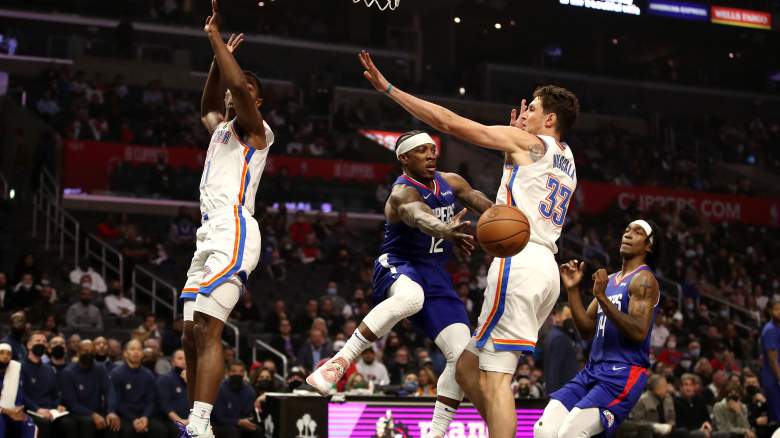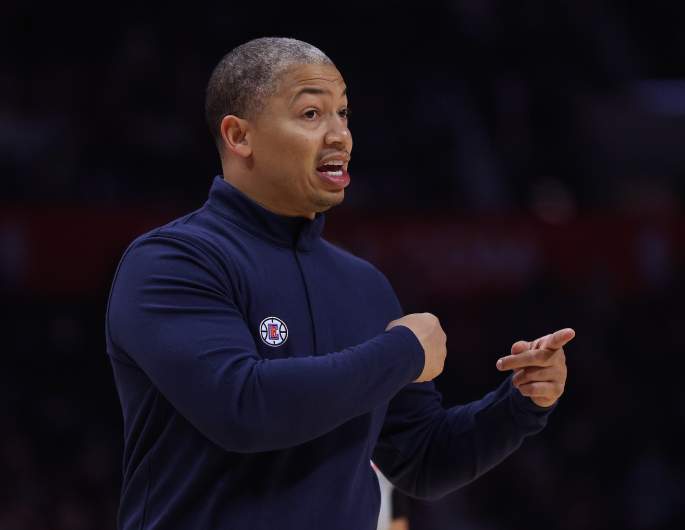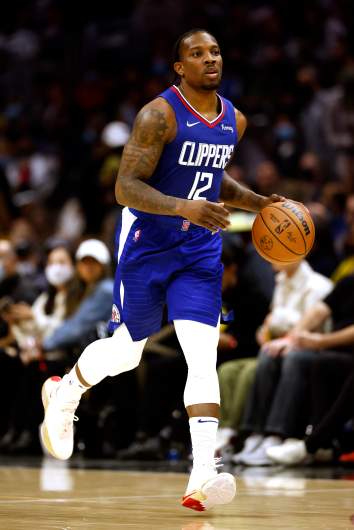
After a lackluster 1-4 start to the season, which featured some truly stupefying performances and surely had many L.A. fans fearing a major step back from last season’s long postseason run, the Clippers are now rolling.
Winners of seven straight before dropping one to Chicago Sunday night, some of the more worrisome aspects of L.A.’s slow start have seemingly dissipated.
Bespeckled playoff hero Reggie Jackson is locating the basket again (even with a 4-for-17 night against the Bulls, his shooting percentage has risen 14 points since the start of November), veteran point guard Eric Bledsoe is playing more decisively, and the second unit, led by Terance Mann, Luke Kennard and a surprisingly effective Isaiah Hartenstein, is displaying tremendous chemistry and no longer being asked to make amends for the first unit’s deficiencies. All this while Paul George continues to make an early claim for league MVP.
Follow the Heavy on Clippers Facebook page for the latest breaking news, rumors and content out of Clipper Nation!
But despite the positive signs, it’s still unlikely the Clippers will do much come playoff time without their first team All-NBA forward Kawhi Leonard, who is rehabbing from ACL surgery and not guaranteed to make it back this season. And if he does, there’s obviously no guarantee he’ll return to form in time to make a difference.
The Ringer’s Jonathan Tjarks, however, believes that Leonard, in any manner, will tilt the scales considerably, and that even if he’s “not himself,” the Clippers will still have two crucial things going for them, one of which is less than obvious.
Go With Your Gut
As a guest on the November 12 episode of the Bill Simmons Podcast, following a lengthy discussion of Paul George’s career and his underappreciated skillset (Simmons listed George the 6th best player in the league at the moment and the 6th best small forward since 2000), Tjarks explained why he is “kind of sneakily confident” in the Clippers chances aside from Leonard.
The first reason involves head coach Ty Lue, specifically his aptitude for in-series adjustments. “If the West is fairly even and if these playoff series are super tight and it becomes coaches playing chess, I’ll take Ty Lue over anyone in the league when it comes to playing chess,” said Tjarks. “That man, he might make a mistake in the playoff series but he will correct it fast. And he’s got some versatile pieces.”

GettyTy Lue, Clippers head coach
Lue’s strategizing-on-the-fly was on full display during last season’s playoffs when he helped shepherd the Clippers to the Western Conference Finals despite being down 0-2 in each of the first three series. In each instance, after beginning the series with a traditional big man down low, Lue switched to a wing-heavy small-ball lineup that employed aggressive perimeter defense, gang rebounding and a super-spaced half-court offense.
Tjarks, a University of Texas graduate who previously covered the Dallas Mavericks for a variety of publications, used the Clippers first-round, seven-game series victory over the Mavs as an illustration of Lue’s mentality:
I would say in that series against the Mavs, he probably stayed big a little too long, but when he had to make the move, he made the move. When you look at the minutes, between Game 1 and game 5, Ty Lue basically changed his entire team. The rotation got completely flipped supper super fast. He said ‘OK this isn’t working, I’m on to the next thing, I’m not waiting around.’
Against Dallas, guard Patrick Beverley and center Ivica Zubac both started Games 1 and 2, but by Game 7, they had been replaced by Nicolas Batum and Jackson. What’s more, point guard Rajon Rondo, who was acquired in March almost entirely for his prior playoff excellence, played 23 minutes in the series opener but saw just 19 minutes total over the final two games. Mann, meanwhile, who was not expected to be in the playoff rotation and was on the floor for only 14 seconds in Game 1, played 26 minutes in Game 7.
As Tjarks noted, these were not obvious changes, but rather ones based on Lue’s gut feelings, which turned out to be rarely wrong.
“When you make [playoff] adjustments,” Tjarks said, “these sample sizes are so small, you almost throw the numbers out the window. Because you’re talking about like eight-minute samples. It’s purely your instincts and your conviction on what’s right. And you just got to go with it. And [Lue] seems right more often than not.”
Postseason Tightening Will Unleash Bledsoe
The other reason Tjarks is feeling optimistic about the Clippers’ chances is Bledsoe, specifically how he will fit into what will presumably be another small-ball heavy postseason.
While Tjarks stipulates that Bledsoe, who was acquired this offseason in a trade for Beverley and shot just 33.7% from the field and 18.2% from three over the first 10 games, has a “ton of warts,” he will bring substantial value when playoff rotations tighten.

GettyEric Bledsoe, Clippers
Occasionally speaking from the Clippers’ perspective, Tjarks said this about how the Clippers may use Bledsoe:
One thing he is, he is better when he’s in a small ball situation where he’s the one non-shooter. Bledsoe can just be kind of like this weird Bruce Brown (Brooklyn) kind of player: point-center, crazy athletic, four shooters around him. So the Clippers know they have this sort of wildcard.
But during the regular season we’re going to play Zubac, play Hartenstein…but when Bledsoe plays with those guys we’re not very good because it’s two non-shooters. But we know in a playoff series we’re going to bench them like we benched them against the Jazz [in the Western Conference semifinals], and all of a sudden Bledsoe becomes valuable in a five-out situation.
In fact, the Clippers may not need to wait for a change in rotation for Bledsoe to pay dividends. After his rough start to the season, the 11-year veteran has begun to show real signs of life. Over the last three games, he has averaged 18.1 points on 52.4% shooting from the field and 37.5% from three, adding 5.0 assists and 4.7 rebounds. And, despite Tjarks’s assertion that he will do best surrounded by all shooters, Bledsoe has recently flashed some solid chemistry with his big men, finding both Hartenstein and Zubac near the basket for easy buckets in each of the last three games.
Of course, if Leonard fails to return this season, any talk of Lue’s chess or Bledsoe’s fit could be moot. But if Leonard is anywhere near his usual level, the Clippers could be a tough out, to say the least.
Comments
Analyst Gives 2 Reasons Why He’s ‘Sneakily Confident’ About Clippers